Paris attacks: Third body found in flat raided by police
- Published
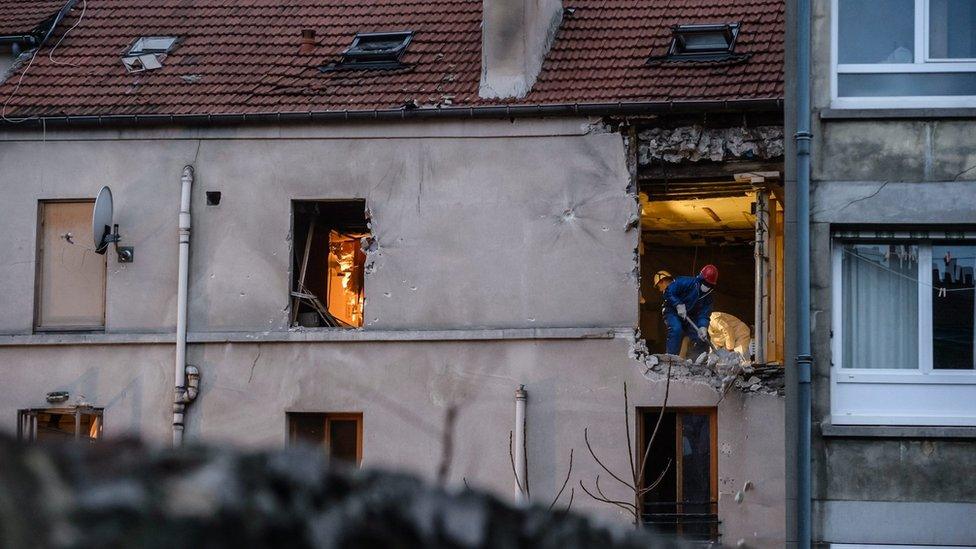
Police laid siege to the flat in Saint-Denis for some seven hours
A third body has been recovered from the apartment in the Paris suburb of Saint-Denis raided by police after last Friday's attacks, prosecutors say.
They also confirmed that one of the dead was Hasna Aitboulahcen, 26, who reportedly blew herself up in the raid.
The alleged ringleader of the attacks, Abdelhamid Abaaoud, is also confirmed to have died in Wednesday's raid. The third body is still being identified.
EU ministers have decided to tighten checks, external on all people entering Europe.
At present only non-EU nationals and migrants are systematically checked by police at the EU's external borders. But now the EU will extend those database checks to EU citizens too.
Travellers' details will be checked against data in the Schengen Information System (SIS), which lists wanted terror suspects and people linked to organised crime.
Most EU countries are in the Schengen zone - a passport-free travel area. After the Paris attacks it emerged that terror suspects had not been detected at the EU's external borders.
"Female terrorist pretended to try to give up", says 'Hugo', head of the elite police assault group which carried out the raid in Saint Denis
The European Commission has called for the establishment of a Europe-wide intelligence agency.
Paris defiance
France's Prime Minister Manuel Valls announced on Friday that the death toll from the attacks a week ago by suicide bombers and gunmen has risen to 130 people.
Hundreds of people were wounded in the near-simultaneous attacks on Paris bars and restaurants, a concert hall and sports stadium.
France has approved a three-month-long state of emergency.
Islamic State (IS) said it was behind the attacks - the worst in Europe since the 2004 Madrid bombings.
Demonstrations have been banned under France's state of emergency, but dozens of French artists and cultural figures have urged people to make a lot of "noise and light", by turning on music and lights, at 21:20 (20:20 GMT) on Friday to mark the exact time a week ago that the attacks began.

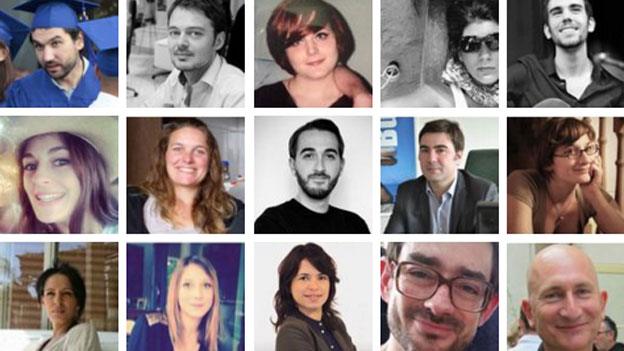

Prosecutors have now confirmed the identities of two of the three suspects who died in the seven-hour-long raid in the Rue Cormillon apartment on Wednesday morning.
The prosecutor's office said Hasna Aitboulahcen's passport was found near her body.
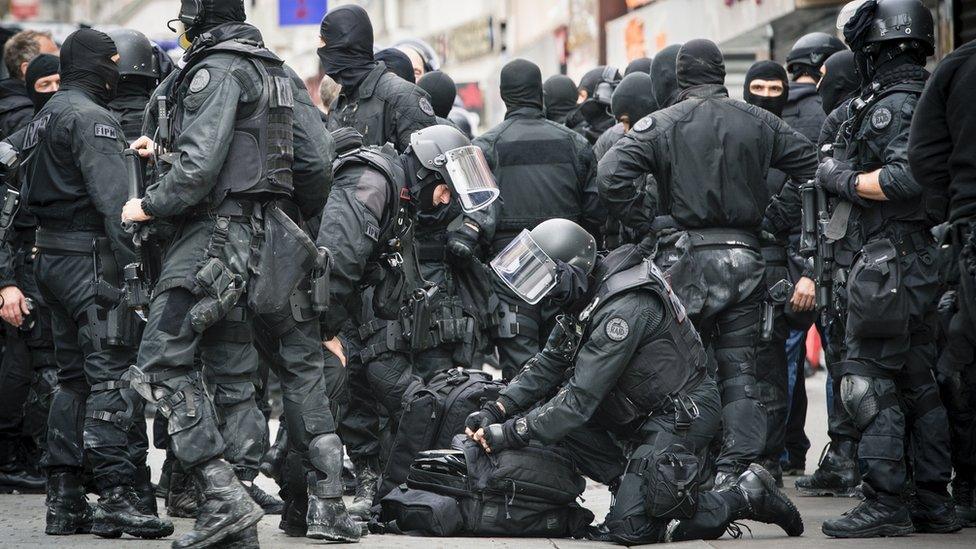
French authorities have released new images of Wednesday's raid
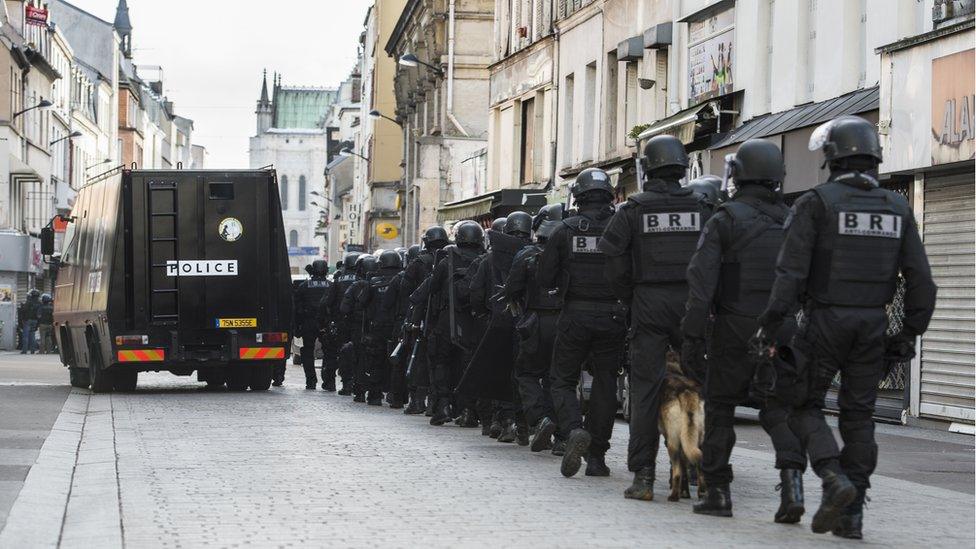
The elite BRI police unit was one of those that took part
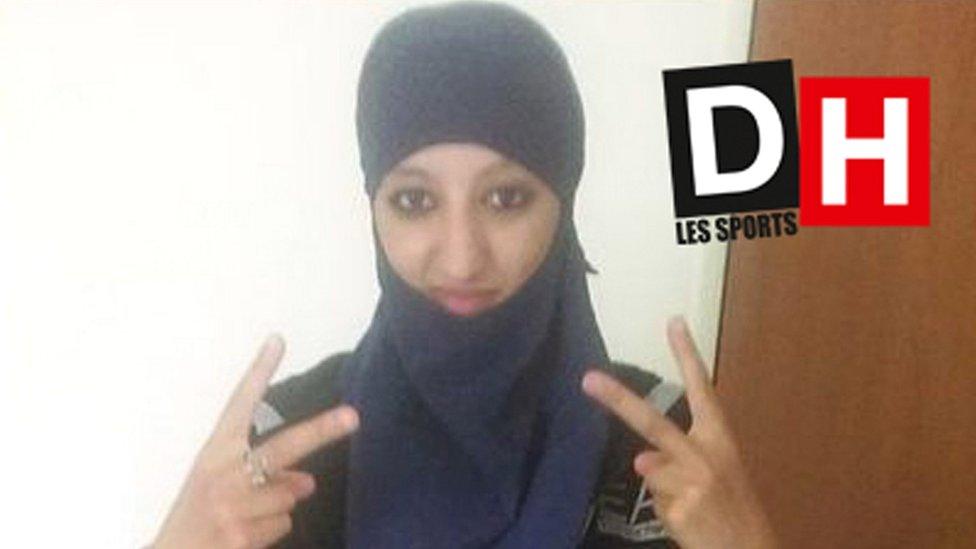
Hasna Aitboulahcen blew herself up when police raided the flat in Saint-Denis
News that Abaaoud - a well-known face of IS and on international "most wanted" lists - and at least one of his accomplices may have travelled undetected from Syria before carrying out the attacks has raised fears about EU border security.
In Brussels, France's Interior Minister Bernard Cazeneuve said he and fellow ministers agreed that the EU would also tighten security over:
Firearms - to prevent trafficking of illegal firearms, through common marking of weapons and efforts to block smuggling from the Balkans
Passenger Name Records - to collect data systematically on people flying to and from EU countries; the data could be kept for a year, instead of one month as was proposed previously.
Khemissa: "I don't think [Hasna Ait Boulahcen] had the intention to be a suicide bomber. She was influenced. She was vulnerable."
Germany's Interior Minister Thomas de Maiziere said Europe must exchange information on the gun trade. "We can only fight terrorism with a better information exchange," he said.

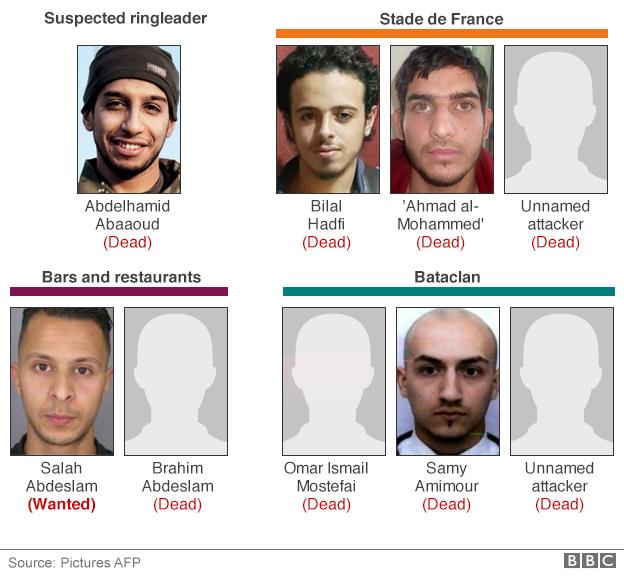
The Paris attackers
More on the Paris attacks
A doctor's story An emergency department medic describes his Friday night shift
Rethinking strategy Time for West to review its priorities in Syria
How vulnerable is Europe? Putting the dangers in perspective
What happened in Paris? How events unfolded on Friday evening in the French capital
Shoot-out in Saint-Denis How the raid on suspects unfolded

In a stark warning of the dangers facing Europe, Germany's head of domestic intelligence, Hans-Georg Maassen, told the BBC that IS was "starting a terrorist world war".
He said IS had made Europe its enemy and European countries had to "assume something like Paris can happen any time".
He also said he was concerned that Islamist extremists could recruit refugees from Syria, now housed in camps in Germany and other parts of Europe, who may have been trained in the use of weapons during four years of civil war.

What is Islamic State?
IS is a notoriously violent Islamist group which controls large parts of Syria and Iraq. It has declared its territory a caliphate - a state governed in accordance with Islamic law - under its leader Abu Bakr al-Baghdadi.
What does it want?
IS demands allegiance from all Muslims, rejects national borders and seeks to expand its territory. It follows its own extreme version of Sunni Islam and regards non-believers as deserving of death.
How strong is IS?
IS projects a powerful image, partly through propaganda and sheer brutality, and is the world's richest insurgent group. It has about 30,000 fighters but is facing daily bombing by a US-led multi-national coalition, which has vowed to destroy it.
